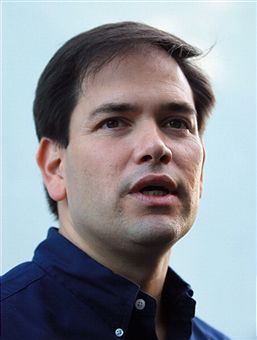 Of all the good news that the American Right is savouring at the moment, Marco
Rubio’s victory must be near the top. Rubio won 49 percent of Florida’s vote, defeating Democratic Congressman Kendrick Meek (20 percent) and (at 30 percent) Governor Charlie Crist, a
frightfully ambitious former Republican, turned independent, who reportedly flirted with joining the Senate Democratic caucus, if elected. Rubio, a rising conservative star, promises to glow like
the Sunshine State that he will represent.
Of all the good news that the American Right is savouring at the moment, Marco
Rubio’s victory must be near the top. Rubio won 49 percent of Florida’s vote, defeating Democratic Congressman Kendrick Meek (20 percent) and (at 30 percent) Governor Charlie Crist, a
frightfully ambitious former Republican, turned independent, who reportedly flirted with joining the Senate Democratic caucus, if elected. Rubio, a rising conservative star, promises to glow like
the Sunshine State that he will represent.
For years, Republicans have been chided — rather unfairly — as the party of old, bald white men. Rubio undermines this accusation. Just 39 years old, Rubio exudes warmth and good
humour. His youthful demeanor and movie-star good looks serve him well. Whether pundits like it or not, these things matter to voters.
Part of the pain of the George W. Bush years was watching the President of the United States struggle to place three or four sentences in a row. Too many Republicans endure a similar malady, though
rarely with such severe symptoms. In contrast, Rubio communicates very clearly. His campaign speeches and TV interviews were cogent, forceful, and self-confident.
Republicans also have mixed success in appealing to minority voters. Only some 10 percent of blacks usually vote Republican, seemingly no matter what. But up to 40 percent of Hispanics have voted
Republican, as benefitted President Bush in 2004.
However, the highly contentious debate on immigration reform has hammered the GOP’s reputation among Hispanics. In 2008, Senator John McCain (R – Arizona) won just 31 percent of that
demographic, according to Pew Research, despite being considered fairly relaxed on immigration. (Pew further reports that 34 percent of Hispanics voted for Republican House contenders Tuesday,
versus 30 percent in the 2006 mid-term elections. The numbers for blacks were 9 and 10 percent, respectively — exactly where they have been cemented for decades.) As a high-profile American
of Cuban ancestry, Rubio offers Republicans a decent chance to heal their self-inflicted wounds as concerns Hispanics.
Assuming that his positives on the campaign trail follow him into office, Rubio appears destined for the GOP national ticket, perhaps as the running mate to an older and more established nominee
or, no less likely, as the younger presidential contender who would share the bill with a seasoned “graybeard” — much as George W. Bush and Barack Obama placed, respectively,
former Defense Secretary Dick Cheney and former U.S. Senator Joseph Biden (D – Delaware) on their respective tickets.
If so, Rubio would bring to the table his star power, youthful energy, and Florida’s 27 electoral votes, one tenth of what’s needed to secure the Electoral College. That could be a
powerful hand to play.
Atmospherics and electoral maths aside, the best thing about Rubio is that he is an idea-driven free-market conservative. Unlike too many top GOP officials, Rubio will not simply blow around with
the breeze.
He is a one-man think tank. His website includes “10 Simple Ways to Lower HealthCare Costs,” “12 Simple Ways to Improve Education,” and “23 Simple Ways to Create
Jobs.”
Among his “12 Simple Ways to Cut Spending,” he suggests:
Such ideas are catnip to conservatives. Further, as David Cameron and Nick Clegg’s budget cuts suggest, they are exactly the sort of thing that an overextended industrial democracy must do to rebuild its fiscal house.“To get spending under control…we should freeze federal civilian workforce pay for one year and bring the pay scale back in line with market rates. In addition, we should reduce its size to 2008 levels. To accomplish this without disrupting critical government services, we should implement a policy of only hiring just one civilian employee for every two who leave government.” Rubio also believes that “We should mandate that all discretionary spending programs end every 10 years after the Census, unless Congress specifically votes to continue them.”
As an intellectually and visually appealing senator-elect, Marco Rubio is as good as it gets among this week’s crop of newly minted Republican parliamentarians. His future is as bright as an afternoon on South Beach.
New York commentator Deroy Murdock is a nationally syndicated columnist with the Scripps Howard News Service and a media fellow with the Hoover Institution on War, Revolution and Peace at Stanford University.






Comments